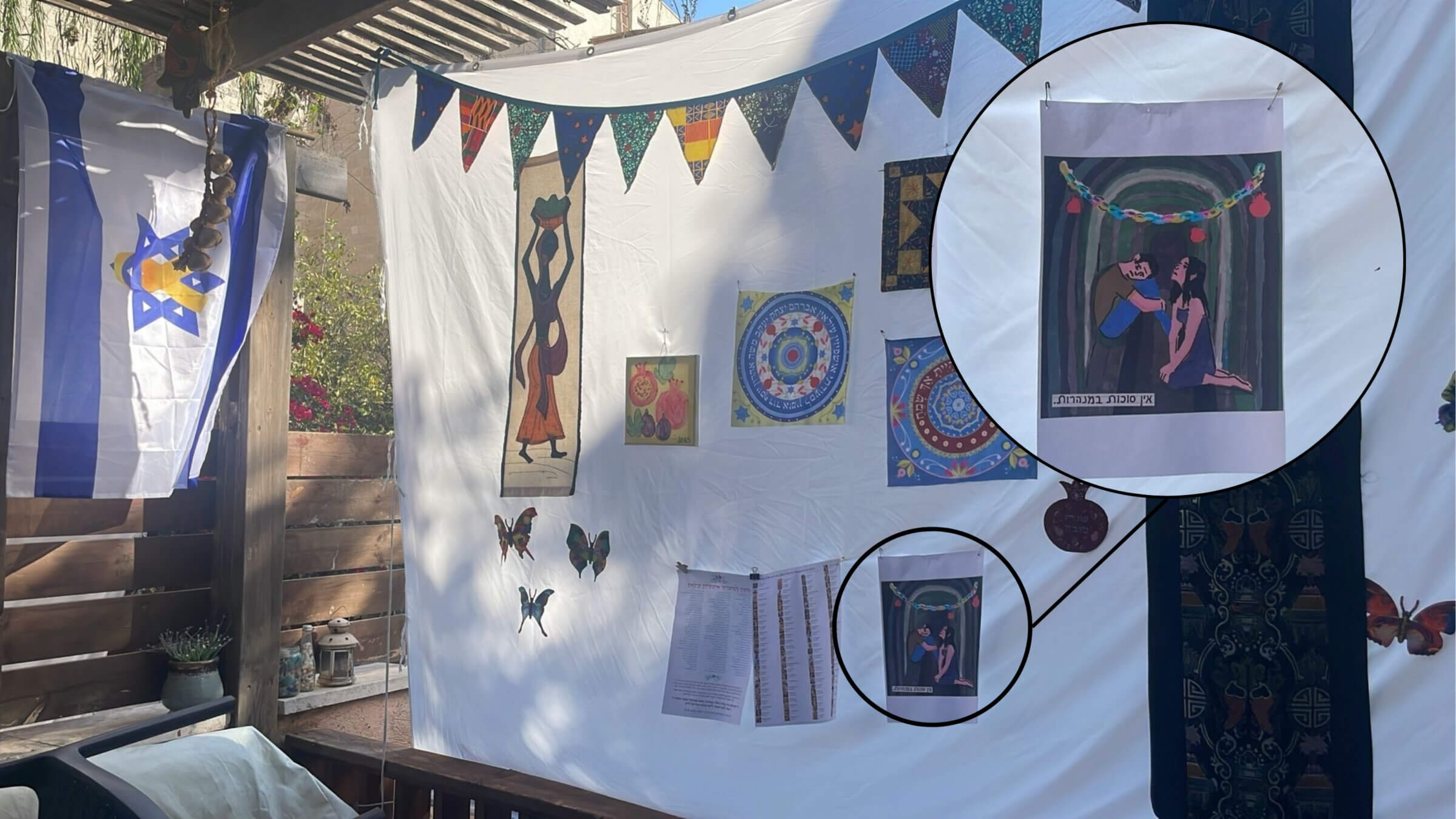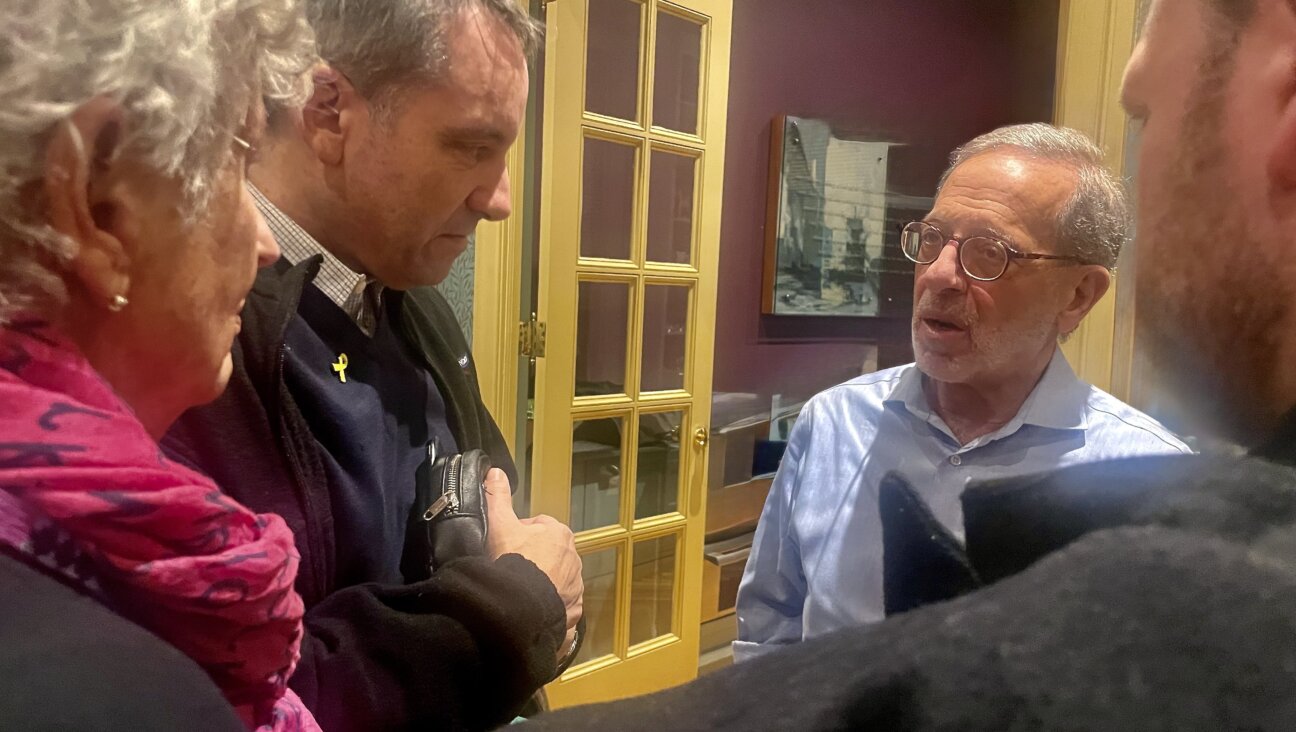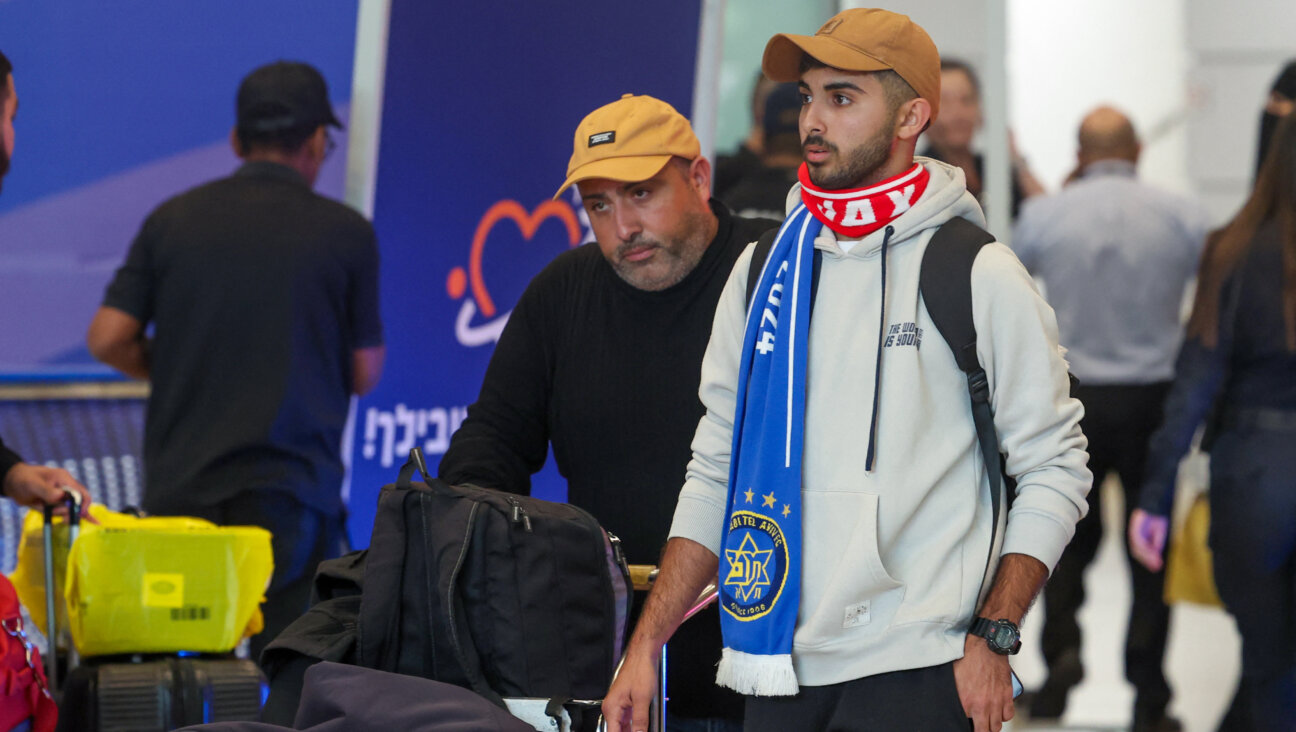Sinwar, Sukkot and what Netanyahu needs to do now
End the war now and the remaining hostages could be home by the end of the holiday

Jessica Steinberg printed and displayed in her Sukkah an Instagram post from a famous Israeli illustrator, Zeev Engelmayer, that shows two Israeli hostages observing Sukkot in a Hamas tunnel. Courtesy of Jessica Steinberg / Canva
The remarkable news that Israel had killed Hamas chief Yahya Sinwar broke in the middle of a Jewish holiday, just like the horrific massacre Sinwar orchestrated last Oct. 7. That means most Israeli Jews were with family or friends and generally not looking at their phones.
But one of the myriad ways the universe has changed through this year of war and loss is that even those who generally avoid technology on such holidays now stay looped. My friend Jessica Steinberg hosted lunch in her Jerusalem sukkah Thursday; as soon as the guests left, her husband ducked inside to check the headlines. Meanwhile the couple’s 16-year-old twin boys took the dog out for a walk and heard of Sinwar’s “elimination” from a neighbor.
“Whoever is looking at their phones tells the people who are not looking at their phones,” Jessica explained. “By the time chag was over, I’m sure everyone knew,” she added, using the Hebrew word for holiday. “Even if you were the most devout person, someone would have stopped you and said, ‘Did you hear?’”
The dramatic news makes fulfilling the central commandment of Sukkot, to be joyous in the holiday, a little less impossible. The question now is whether Prime Minister Benjamin Netanyahu will take the win and end the war, bringing the remaining hostages home and forging a path toward peace with the Palestinians. That’s what leadership looks like.
Netanyahu said from the beginning that the war had two goals: to destroy Hamas, the terror group that infiltrated Israel on Oct. 7 and killed some 1,200 innocent people, and free the 250 hostages they abducted.
The question is how you define “destroy Hamas.” It is simply not possible to assassinate every Hamas fighter, nor to snuff out a hateful ideology. The only reasonable way to interpret this goal, then, is to degrade the group’s military capabilities and dismantle its leadership. These have been done. Exhibit A is that there was no rocket barrage on Israel in response to Sinwar’s death; what is left of Hamas is in disarray amid a destroyed Gaza.
It is clear that Sinwar, a madman who did not care how many Palestinian civilians died for his dream of destroying Israel, was an impossible obstacle in ceasefire negotiations, by insisting that Gaza must continue to be ruled by Hamas. Now that he is gone, we will see whether Netanyahu is equally responsible for the impasse.

The prime minister must drop his insistence that the Israeli military remain active in the strip and singularly focus on the return of the remaining 101 hostages. Israel must take a back seat in the Gaza day-after plan, and Netanyahu himself should depart the political stage, replaced by leaders who understand that the only way Israel can remain a Jewish and democratic state is if there is an independent Palestine alongside it.
Not doing these things now would prove right the critics who have been saying all along: He kept the fighting going mainly to stay in office and avoid both his pending corruption trial and investigations into his failures around Oct. 7.
But Netanyahu now has perhaps his best chance to step aside as a winner, having killed not just Sinwar but also the elusive Hamas military commander Mohammed Deif and political chief Ismail Haniyeh, plus the forever leader of Hezbollah, Hassan Nasrallah.
No one could have imagined, a year ago, that these four evil men would be removed from the scene. Israel has achieved an enormous victory — but it has come at enormous cost, in Palestinian and Lebanese lives; in international standing; and in damage to the Israeli psyche.
“There’s no way to believe anymore, there’s no way to trust what he says, because he has said so many times, ‘Let’s negotiate,’ and it’s come to nothing,” Jessica told me when we spoke this morning.
“Everyone is desperate for this thing to end, and to be past it, and to be able to look forward somehow — but there are many huge question marks,” she added. “There have been so many times in the last 12 months where statements were made that seemed very forthcoming, very forward looking, anything to make a deal, we’re going to bring them home — and then it became clear it was just talk.”
I called Jessica today rather than a bunch of Israeli security and political experts because I wanted to get a sense of what Israelis were feeling about Sinwar’s killing rather than what they were thinking. She is super in tune with the zeitgeist, and especially with the mood of hostage families, who she has spent the last year writing about for The Times of Israel.
We have a ton in common — both journalists, both mothers of twins, both shaped by Jewish summer camp. The daughter of a Conservative rabbi, Jess moved to Israel in 1995, at age 25. Besides her day job, she is also the aunt of reservists who have been in and out of Lebanon these recent weeks; a neighbor and friend of Jon and Rachel Goldberg-Polin; and a weekly volunteer on Israeli farms, all of which she chronicles movingly in her newsletter, “Jessica’s Substack.”
I asked Jess how Israelis were handling Sukkot, the weeklong holiday of festive gatherings in temporary huts that is literally called, in Jewish liturgy, “the time of our happiness.”
She’d written about how the family of Guy Gilboa-Dalal, one of the 44 hostages taken from the Nova music festival on Oct. 7, never took down last year’s sukkah, have filled it pictures of him, and planned to sit in it this holiday but not be “celebratory.” Now she told me about a conversation she had with Herut Nimrodi, whose son, Tamir, was a 19-year-old soldier when he was abducted on Oct. 7.
“She has two younger daughters, who are 14 and 17, and she said that throughout the year she’s had a lot of moments where her daughters need to laugh and have fun, and that’s what she’s tried to do as well as be Tamir’s mother,” Jessica said. “She said to me she wanted to make sure her daughters still have their childhood.
“I heard what she said and it really resonated for me. I have twin 16-year-olds who needed to build the sukkah and decorate it and mark this holiday just like we’ve always marked this holiday.”
Well, not “just like” they’ve always marked it. Some people she knows put up sukkahs as usual but did not decorate them. Others hung yellow ribbons to symbolize the hostages, or pictures of them, or prayers for their safe return. The Goldberg-Polins’ synagogue created a garland featuring a drawing of their son Hersh, one of six hostages found murdered in a tunnel at the end of August.
Jessica’s family, for the first time, included an Israeli flag alongside the butterflies and pomegranates adorning the cloth walls of the sukkah on their back deck. And she printed out an Instagram post from a famous Israeli illustrator, Zeev Engelmayer, that shows two forlorn hostages sitting in a tunnel under a paper-link chain like those used to decorate sukkot everywhere.
The caption underneath says, “There is no Sukkot in the tunnels.”
Jess’s great-niece, who is 6, saw the image and asked, “Why are they so sad?”
“I said: ‘Because they don’t have very good sukkah decorations,’” Jessica told me.
If Netanyahu does the right thing, they could be home before the holiday ends next week.
Correction: The original version of this article misspelled the surname of the hostage whose family has kept last year’s sukkah up in his honor. It is Gilboa-Dalal, not Gilboa-Nadal.























